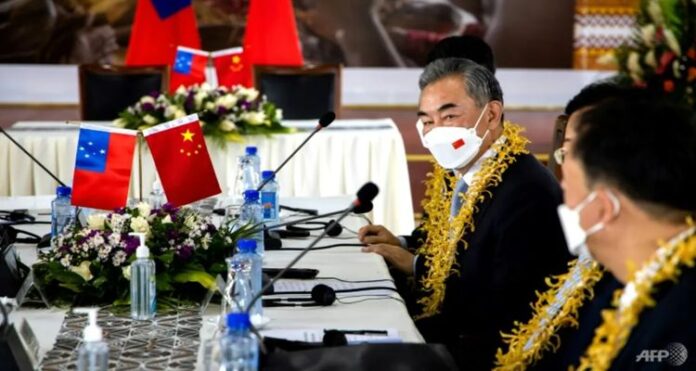| Translate This News In |
|---|
Chinese Foreign Minister Wang Yi and ten Pacific Island nations failed to come to an agreement on a broad security agreement Monday, despite warnings that the proposition would push the region into “Beijing’s orbit.” A virtual summit of representatives and foreign ministers was expected to discuss proposals to significantly increase China’s involvement in the South Pacific’s security, economy, and politics. However, the effort popped up to have failed after some regional leaders expressed grave concern.
“As always, we put consensus first,” said co-host and Fijian Prime Minister Frank Bainimarama after the meeting, implying that broad agreement would be required before signing any “new regional agreements.”
Wang is in Suva, Fiji, as part of a 10-day diplomatic blitz in which Beijing competes with Washington and its allies for influence in the strategically important Pacific.
Prior to his visit, China proposed a pact in which Beijing would train Pacific Island police, participate in cybersecurity, strengthen political ties, conduct sensitive marine mapping, and obtain increased access to natural resources on land and in the sea.
As an enticement, Beijing offered huge amounts of money in financial aid, the spectre of a China-Pacific Islands free trade agreement, and access to China’s massive 1.4 billion-person market.
China has positioned itself as a “major developing nation” that stands shoulder to shoulder with small & mid nations in the South Pacific.
According to state broadcaster CCTV, President Xi Jinping sent a message ahead of the meeting saying that China would be a “good brother” to the region and that they shared a “common destiny.”
However, President of the Federated States of Micronesia David Panuelo warned other regional leaders in a letter that the proposed agreement was “disingenuous” and it would “ensure Chinese influence in the government” and “economic control” of key industries.
Wang did not directly refer to the proposed “Common Development Vision” document following Monday’s closed-door meeting, but said the sides would “continue to have ongoing and in-depth conversations and consultations to shape more consensus on cooperation.”
“China will release its own position paper,” he added, outlining “our own positions and propositions, as well as cooperation propositions with Pacific Island countries.”
Instead, Wang announced that ten Pacific Island nations had signed signed a memorandum of understanding on China’s “Belt and Road” infrastructure initiative, urging those concerned about Beijing’s intentions not to be “too anxious and nervous.”
Act of balancing
The US State Department warned South Pacific countries to be wary of “shadowy, vague bargains with little transparency” in response to China’s move into the region.
Australia joined the US in opposing China’s efforts to extend its security reach deep into the area, with the country’s new foreign affairs minister warning of the “consequences” of such agreements.


















